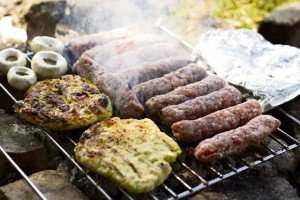Outdoor gatherings are the perfect place for grilling hamburgers, hot dogs, kabobs and any number of foods, but accidents can happen.
“It is important to be careful around outdoor grills, because you can seriously burn yourself or other people, and you can start a fire and burn up property,” said Chief Warrant Officer 4 Joseph Reese, senior maintenance officer, Ground Task Force, U.S. Army Combat Readiness/Safety Center.

Fire departments responded to an annual average of 7,700 outdoor grilling fires from 2004-2008, according to the National Fire Protection Association. These fires caused 13 civilian deaths, 120 reported injuries and $70 million in direct property damage per year.
In half of home fires caused by home outdoor grills, the first thing ignited was flammable or combustible gas or liquid, according to NFPA’s latest statistics. In 51 percent of the home outdoor fires in which grills were involved, the fire started when a flammable or combustible gas or liquid caught fire.
Reese recommended the following precautions for outdoor grilling:
• Never use a charcoal grill in an enclosed space, because deadly carbon monoxide is a byproduct of the charcoal fire.
• Only use an approved charcoal lighter fluid to start up a charcoal-fired grill.
• Follow the instructions for lighting your gas grill.
• Grills need to be kept away from houses, fences, trees and anything else with a propensity for burning.
• Perform a thorough safety inspection before lighting the grill.
• Don’t wear loose clothing. Non-flammable short-sleeved shirts and form-fitting clothes are best attire.
• Keep all other flammable materials far away from the grill.
• Never add lighter fluid or any flammable liquid to a burning fire.
• When lighting a gas grill use the 10 to five rule. If the grill does not start within 10 seconds, turn off the gas, leave the lid open and give it 5 minutes before you try again.
Food handling
An associated hazard of outdoor grilling is food contamination from bacterial causes, which occurs quickly in warm weather, especially in the summer, Reese said.
“If the food looks unusual or smells bad, you should trust your senses and don’t eat it,” he said. “Make sure to wash your hands and keep the cooking area clean.”
Other tips include:
• Cover cuts and other injuries using waterproof bandages or by wearing latex gloves.
• Clean all utensils and other food-contact surfaces thoroughly before using them to prepare other food.
• Cook food thoroughly.
• Avoid leaving food at room temperature. Refrigerate food as soon as possible. Reheat food correctly.
• Store raw and cooked foods separately. Tightly wrap all food before putting into refrigerator or freezer.
Cross contamination is another cooking hazard, Reese said. It may be caused directly from poor storage when the juices from raw meat are allowed to come into contact with cooked food or indirectly from a chopping board, work surface or food handler’s hands.
Tips include:
• Use different chopping boards for meat, salad and fish.
• Use different plates to serve with and do not eat from the serving plates or chopping boards.
• Areas used for processing should be scrupulously clean or cross-contamination can easily occur, especially with meat products.
• Wash hands frequently. If using gloves, change them when changing the types of food being handled.
For more grilling and food safety tips, visit www.nfpa.org and www.cdc.gov. For more information about composite risk management, visit https://safety.army.mil.
